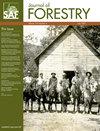风险在评估者的眼中:比较德国四种非本地树种的风险评估
IF 3.2
2区 农林科学
Q1 FORESTRY
引用次数: 16
摘要
对生物多样性构成威胁的非本地树种(NNT)在一些欧洲国家被列为“入侵”树种。然而,针对特定国家的风险评估方法可能导致在具有可比增长条件的国家之间对相同的NNT得出不同的结果,从而使人们对风险分类的可靠性产生怀疑。在这里,我们分析了德国和邻近国家使用的六种风险评估工具的实用性和一致性,使用了四种NNT(宾夕法尼亚白蜡树沼泽)。泡桐;泡桐;(前Murray), menziesii伪糖(Mirb.)Franco和Quercus rubra L.)作为案例研究。使用这些工具对同一NNT和参考区域(德国)的风险进行分类,对所有NNT产生了不一致的结果。造成这种情况的原因是:(1)标准的分类和权重不同;(2)缺乏量化入侵风险的数据;(3)与评估方法相关的不确定性。此外,这些工具无法区分NNT在不同地点造成的风险。我们建议,应利用包括NNT的建立、扩散和潜在影响在内的特定地点清查数据,对不同生态系统类型进行风险评估。我们的建议为制定一致的、系统的泛欧方法提供了基础,以评估入侵,同时解决风险和森林管理方面的问题。本文章由计算机程序翻译,如有差异,请以英文原文为准。
Risk is in the eye of the assessor: comparing risk assessments of four non-native tree species in Germany
Non-native tree species (NNT) that pose risks to biodiversity are classified as ‘invasive’ in some European countries. However, country-specific risk assessment methods may lead to different results for the same NNT between countries of comparable growth conditions, raising doubts about the reliability of risk classifications. Here, we analysed six risk assessment tools used in Germany and adjacent countries for their practical applicability and consistency using four NNT (Fraxinus pennsylvanica Marsh., Paulownia tomentosa (Thunb. ex Murray), Pseudotsuga menziesii (Mirb.) Franco and Quercus rubra L.) as case studies. Using these tools to classify risks for the same NNT and reference area (Germany) yielded inconsistent results for all NNT. The reasons for this were (1) differences in classification and weighting of criteria, (2) a lack of data to quantify invasion risks and (3) uncertainties related to assessment methodologies. Moreover, the tools fail to distinguish between risks posed by NNT in different sites. We suggest that instead the risks should be assessed for different ecosystem types by using site-specific inventory data covering the establishment, spread and potential impact of NNT. Our recommendations provide a foundation for developing a consistent, systematic Pan-European approach to assess invasiveness while addressing both risk and forest management aspects.
求助全文
通过发布文献求助,成功后即可免费获取论文全文。
去求助
来源期刊

Forestry
农林科学-林学
CiteScore
6.70
自引率
7.10%
发文量
47
审稿时长
12-24 weeks
期刊介绍:
The journal is inclusive of all subjects, geographical zones and study locations, including trees in urban environments, plantations and natural forests. We welcome papers that consider economic, environmental and social factors and, in particular, studies that take an integrated approach to sustainable management. In considering suitability for publication, attention is given to the originality of contributions and their likely impact on policy and practice, as well as their contribution to the development of knowledge.
Special Issues - each year one edition of Forestry will be a Special Issue and will focus on one subject in detail; this will usually be by publication of the proceedings of an international meeting.
 求助内容:
求助内容: 应助结果提醒方式:
应助结果提醒方式:


